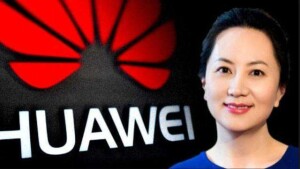
In December 2018, while transiting through Canada on her way to Mexico, Ms Wanzhou Meng was taken off her plane, questioned and arrested. Her arrest followed earlier restrictions imposed by the US government on Chinese telecom giant Huawei (of which Ms Meng is the CFO). What actually happened? Is it a campaign against Huawei or China? And if so, is the campaign, and Ms Meng’s arrest legitimate?
The restrictions on Huawei and arrest of Ms Meng have taken place in a particular political context, in a struggle between China and the US for political and commercial dominance. One aspect of this struggle is technological dominance. In recent years, China repeatedly identified technological development and advancements as one of its strategies for the future. China’s key opponent and competitor is the US. Traditionally, the US had the upper hand thanks to its technological giants such as Apple and Google and the Silicon Valley hub. However, more recently, a number of Chinese national champions started challenging the US control of the global market. Huawei is probably the most significant example. Although it is privately owned, Huawei is nevertheless perceived as one of China’s national treasures. As such, it is inevitable that the Chinese government does exercise a degree of influence over its activities and – many say – its data. Citing Huawei’s close connection with the Chinese government, the Communist Party and Chinese Liberation Army, as well as the fear that Huawei’s technology and access to information could be used to spy on the US government, companies and individuals, the Obama administration (following a report from the House Intelligence Committee in 2012) issued a warning to US companies not to use Huawei networking equipment.
Further steps have been taken by the Trump administration since 2017. Following months of threats, the US imposed a number of tariffs on China in retaliation for its alleged unfair trade practices. As a part of the US-China trade war, Huawei was designated a national security threat by the US Federal Communications Commission. Moreover, it was also accused of trading with Iran and North Korea (despite the US sanctions) and lying to FBI investigators. Undoubtedly, Huawei’s growing global influence and the threat to US dominance also played a role. In response, former President Trump signed an executive order in May 2019, which banned US companies from working with counterparts that posed national security risk – including Huawei and ZTE. As a result, Huawei was effectively banned from the US communications networks, and Huawei phones around the world could not use software or apps developed by Apple or Google. The ban was later extended till May 2021.
Huawei has played a key role in developing and providing equipment for the new 5G technology. Former President Trump’s executive order effectively excluded the company from participating in the development and marketing of its 5G equipment in the US. Moreover, former President Trump also put pressure on its allies to ban Huawei from their 5G networks and refuse Huawei’s 5G equipment. It was a clear attempt to gain the upper hand in the technological race as well as to put pressure on China in the drawn-out US-China trade war.
A question that we must, therefore, consider is one of legitimacy. A number of claims have been made by the US against China, but none of them has been proven yet. The situation is, however, a complex one. National security is a black box which can provide a veil of legitimacy to a wide range of activities – from entirely justifiable and necessary steps to unscrupulous and objectionable ones. The difficulty in placing a particular measure on such scale is that national-security-related information is not publicly available nor can it be made available to the general public because doing so may actually be harmful to the national interests. As such, whether or not Huawei actually poses a threat to the national security of the US and its allies cannot be fully ascertained. The campaign against Huawei appears to be politically motivated and not firmly supported by any proven claims.
Alongside the claims directed at Huawei – and to put extra pressure on China in general – the US also seeks extradition of Huawei’s CFO and the daughter of the company’s founder, Ms Wanzhou Meng, from Canada. She was arrested on 1 December 2018 when transiting at Vancouver International Airport on her way to Mexico. She was questioned for three hours without a lawyer or any information about why she was being held. It was only later that she was informed that she was under arrest on allegations of fraud and conspiracy to commit fraud. More precisely, she was accused of lying to banks about Huawei’s business ties to Iran – at that time under US sanctions. These allegations have been adamantly denied by Ms Meng, her lawyers, Huawei and China. Eventually, she was put under house arrest in her Vancouver residence.
The legal battle for her extradition between the US and China began in early 2020. Ms Meng’s lawyers argued that the sanctions against Iran that she was accused of breaching weren’t enforced in Canada. As such, Ms Meng’s lawyer argued, Canada was asked to enforce US sanctions extraterritorially. Nevertheless, the Supreme Court of British Columbia in Canada ruled in May 2020 that the case met the threshold of double criminality as the charges would constitute crimes in both Canada and the US and so the extradition hearing could commence.
Two years after her arrest – on 4 December 2020 – it was announced that the US Justice Department was in discussions with Ms Meng’s lawyers about a deal that would allow her to return home. Such deal, it seems, would involve her admitting to some form of wrongdoing – in exchange for her release. An alternative is to wait until the Canadian extradition hearing finishes in April 2021. She could be jailed for up to 30 years in prison if found guilty.
On the face of it, the arrest and investigation of the permissibility of extradition are legally permissible under Canadian laws. However, Ms Meng’s lawyers have recently added an additional submission in which they claim that the arrest involves abuse of process by violating customary international law. In another Supreme Court of Canada case in February 2020 – Nevsun Resources Ltd. v. Araya, 2020 SCC 5 – it was held that customary international law is part of Canada’s common law and must be applied by domestic courts as such. Ms Meng’s lawyers rely and build on that decision. They claim that the US (as the requesting state vis-à-vis Canada) purports to assert jurisdiction in an impermissible manner because customary international law does not permit a state (the US) to assert criminal jurisdiction over actions of foreign national (Ms Meng), outside that state (the US), for representations made to another foreign national (HSBC, a UK-based bank, at a meeting in Hong Kong), where there is no substantial and genuine connection to that state (the US). On the facts, the lawyers claim, the purported connection between the US as the requesting state and Ms Meng’s activities is “wholly insufficient and artificial.” As a result, they say, the fraud-related charges against Ms Meng are unlawful under customary international law.
It is not entirely clear whether the request by the US was driven by genuine concern about abuse of its rules or by politics. It is this author’s opinion that it was primarily the latter. It is probable that the main driving force behind the US request for extradition of and subsequent arrest of Ms Meng in Canada were politically driven and a part of a broader US-China strategy. Shortly after Ms Meng’s arrest, China detained two Canadian nationals – Michael Spavor and Michael Kovrig – and held them without charge in isolation. They were formally arrested in May 2019. In June 2020 – full 18 months after their detention – they were charged with endangering national security. Their arrests have been generally viewed as retaliation for Ms Meng’s arrests. China denies any such motivation. Nevertheless, Chinese officials clearly treat the two cases as connected.
Huawei and Ms Meng have been used as two of many paws in the big game of politics, a power struggle that is likely to shape global power-sharing for decades to come. The legitimacy of the steps that the US has taken against them is unclear, albeit it is highly likely that the restrictions on Huawei’s 5G technology and arrest of Ms Meng are a part of a broader political campaign against China. Canada itself has become a paw in a game with high stakes – but without a chance of getting the spoils. Those will go to China or the US in the end, but at the expense of the real people who got caught in the middle of the row of two ambitious nations seeking global supremacy.
Author

Natalie Mrockova | University of Oxford
Natalie Mrockova used to give a series of lectures and tutorials on Corporate Insolvency Law at the University of Cambridge and tutorials in Land Law, Law of Trusts, Company Law and Contract Law at several colleges at the University of Oxford. She also spent a year teaching at the University of Wuhan in China where she taught Elements of English Property and Contract Law. Her teaching and research are informed by her previous roles as a commercial and legal negotiator and later also as a head of sales in an international manufacturing company.
The opinions expressed in this article are those of the authors and do not reflect the opinions of InHouse Community Ltd, or it’s employees.










